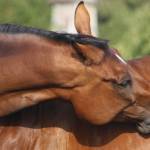Natural Ways to Protect Horses Against Mosquitoes

Rumor has it that owners can protect their horses against mosquitoes without using chemical sprays or wipes and wrestling with fly sheets. Too good to be true? Maybe.
For example, garlic is widely reported to repel mosquitoes. Rubbing garlic on your horse’s coat or feeding garlic is thought to naturally fend off mosquitoes, presumably because of the high sulfur content. Garlic is advocated for helping horses in other ways: to break up mucus in horses with airway disease, to function as an antioxidant, and to act as a natural antiparasitic. The efficacy of garlic in any of these roles, including an insect repellent, has not been proven.
“In addition to lack of demonstrated efficacy, a safe dose of garlic in horses remains unknown. One study* involving long-term garlic supplementation reported Heinz body anemia, which is a low red blood cell count, when fed at 0.4 g/kg body weight,” Kathleen Crandell, Ph.D., a nutritionist for Kentucky Equine Research.
Other examples of food items used to control mosquitoes include:
- Rubbing orange or lemon peels, vanilla, or onion on the coat. Although this may repel mosquitoes, other animals, including insects, could instead be attracted to the odor; and
- Consuming apple cider vinegar. This is also reportedly beneficial for preventing enteroliths and masking changes in water flavor. Research suggests, though, that a cup of apple cider vinegar can contribute to hindgut acidosis.
Rather than relying on these strategies, equine experts recommend using the tried-and-true triad of mosquito control: (1) avoid turning out horses at dusk and dawn, (2) use physical and chemical barriers to stop mosquitoes from landing on your horse, and (3) eliminate mosquito breeding grounds, such as standing water.
“Mosquito-borne diseases such as West Nile virus and Eastern, Western, and Venezuelan encephalomyelitis claim hundreds of horses each year in the United States. In addition to practicing appropriate mosquito-control techniques, have your horses vaccinated,” advised Crandell.
*Pearson, W., H.J. Boermans, W.J. Bettger, et al. 2005. Association of maximum voluntary dietary intake of freeze-dried garlic with Heinz body anemia in horses. American Journal of Veterinary Research. 66:457-465.








